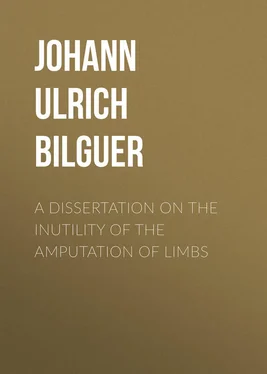Johann Bilguer - A dissertation on the inutility of the amputation of limbs
Здесь есть возможность читать онлайн «Johann Bilguer - A dissertation on the inutility of the amputation of limbs» — ознакомительный отрывок электронной книги совершенно бесплатно, а после прочтения отрывка купить полную версию. В некоторых случаях можно слушать аудио, скачать через торрент в формате fb2 и присутствует краткое содержание. Жанр: foreign_language, foreign_antique, foreign_prose, на английском языке. Описание произведения, (предисловие) а так же отзывы посетителей доступны на портале библиотеки ЛибКат.
- Название:A dissertation on the inutility of the amputation of limbs
- Автор:
- Жанр:
- Год:неизвестен
- ISBN:нет данных
- Рейтинг книги:4 / 5. Голосов: 1
-
Избранное:Добавить в избранное
- Отзывы:
-
Ваша оценка:
- 80
- 1
- 2
- 3
- 4
- 5
A dissertation on the inutility of the amputation of limbs: краткое содержание, описание и аннотация
Предлагаем к чтению аннотацию, описание, краткое содержание или предисловие (зависит от того, что написал сам автор книги «A dissertation on the inutility of the amputation of limbs»). Если вы не нашли необходимую информацию о книге — напишите в комментариях, мы постараемся отыскать её.
A dissertation on the inutility of the amputation of limbs — читать онлайн ознакомительный отрывок
Ниже представлен текст книги, разбитый по страницам. Система сохранения места последней прочитанной страницы, позволяет с удобством читать онлайн бесплатно книгу «A dissertation on the inutility of the amputation of limbs», без необходимости каждый раз заново искать на чём Вы остановились. Поставьте закладку, и сможете в любой момент перейти на страницу, на которой закончили чтение.
Интервал:
Закладка:
Fourthly, Wounds of the larger vessels, which convey the blood into the limb, either, as the only means of stopping the hemorrhage, or through the apprehension the limb should perish for want of nourishment.
Fifthly, An incurable caries of the bone.
Sixthly, If any part is either attacked with a cancer, or is in danger of being so, it is customary to take it off.
I shall treat of these different accidents more or less particularly, in proportion to the number of observations I have made on each of them, as no method of cure, however doubtful and alarming, should be rejected, till a better can be pointed out. Thus, this treatise contains only, in effect, an account of the methods I successfully employed in the military hospitals, for the relief of the above disorders; together with a few observations, and still fewer hypothetical reasonings, which induced me to condemn the use of amputation.
SECT. VII
I shall begin with an account of the means I make use of, internal as well as external, when a limb is mortified, the effects of which have convinced me, that in such cases amputation is not necessary; and here I shall first gratify the curiosity of those readers who, doubtless, are desirous to know what I have learned from the extensive opportunities I must necessarily have had, with respect to the use of the Peruvian bark.
Experience has taught me, that this admirable medicine is possessed of a singular and specific virtue in mortifications.
I know that several physicians and surgeons only recommend it in those which proceed from weakness. I have heard it reported by others, that they found it of little service after the famous battle of Dettingen 6 6 Mr. Ranby, however, who was one of the surgeons of the British troops at the time of the battle of Dettingen, lays great stress upon the bark: It is true, that in one of his cases, having ordered it to an officer of seventy years of age, whose leg had been amputated, on account of his ancle, with the neighbouring parts, having been terribly shattered by a cannon ball , it did not keep the sore from growing worse, or prevent the patient's death. But that we may form a just estimate of the merit of the bark, and the effects of amputation at the same time, it will be necessary to compare this case with the one which precedes it. This comparison will, I imagine, be of use. – I shall quote the author's own words. “An Austrian officer, who had his hand miserably shattered by a cannon ball, was, by some accident, left in a wood near the field of battle, destitute of any manner of help, from Thursday till the Sunday following, when he was brought to Hanau. The next morning I was carried to see him, and to assist in taking off his arm. On viewing it, I found it mortified almost to the elbow, with a great swelling and inflammation quite up to the shoulder. As it was by no means adviseable to attempt an amputation in such circumstances, I proposed giving him the bark; which being no ways objected to, he entered upon immediately. The next day he was rather better: But, on the third, was evidently so. The inflammation was less, the swelling began to subside, and the edges of the mortification were separating. The arm was fomented and wrapped up in the oatmeal and stale beer poultice, with theriaca: And the dreadful symptoms which forbad the operation, were now so much abated, that his surgeons did not at all hesitate to take it off. But this was done to very little purpose; for three or four days after the amputation, being attacked with convulsions, he expired.” I shall here subjoin five questions. Would Mr. Bilguer have amputated in these two instances? Would not his method have saved both these patients, especially the last? Does not amputation seem to have contributed to their death? Does it not evidently appear, that in the latter of these two cases, amputation destroyed the good effects of the bark, which seemed to conduct the patient to a speedy cure; and that in the former case, the bark had not power sufficient to repair the mischief occasioned by the amputation? Does it not follow from these two observations, that however salutary the effects of the bark may be, those of amputation are hurtful in a greater degree? Tissot.
. But perhaps the other circumstances, with regard to the treatment of the patient, did not contribute to promote those good effects which I always observed attended it when judiciously administered. And I make no doubt, but every practitioner who, in prescribing it in cases of mortification, observes the rules laid down by Dr. Pringle, Dickins, Wade, Cheselden, Douglas, Rushworth, Amyand, Shipton and some others, will find it very efficacious. I do not mean, nevertheless, that it should be considered as the only internal medicine; there are, doubtless, other bitters which are sometimes extremely proper on these occasions. I must add, that the bark appears to me to possess that quality which Celsus requires in medicines, whether in a solid or liquid form, adapted to the cure of a mortification, to bind the belly moderately, and brace the whole system. After having treated of the external applications, I shall point out the method in which I administered the bark.
SECT. VIII
Whenever a mortification attacks any part of the body, whether it be owing to an outward hurt, or proceeds from an internal cause, as often happens in persons afflicted with the scurvy, dropsy, a vitiated state of the blood, phagedenic sores, or very aged people, who begin, as it were, to die in the extremities: Whenever, I say, the mortification begins to appear, it requires immediate help. We must begin by making incisions on the part affected, in order to procure a discharge of the corrupted matter, and to assist the action of the medicines. I make long incisions, not only on the mortified parts, but on those adjacent, which would soon be so; I make several of them, as nearly as the large trunks of the blood vessels, and more considerable branches of nerves will allow, not above an inch distant from each other. We ought always to cut to the quick; and if the bone be affected, the periosteum must be cut through, and the bone laid bare. These incisions should follow the direction of the greater number of fibres of the muscles that happen to be thus cut upon; but when the gastrocnemii, the glutei or deltoid muscles have been wounded by a ball, they must be cut cross-ways, otherwise convulsions, particularly the spasmus cynicus, will probably ensue. Several aponeuroses, especially that of the biceps, ought likewise to be cut transversally: It is true, if the longitudinal incisions are sufficiently long and numerous, they take off the tension of these membranes so much as to render the transversal ones unnecessary.
Neither ought the tendons to be spared; they must be boldly cut through transversally.
If a wound, or any other ailment, happens near the articulations, I also, without fear, make large incisions through the ligaments.
It will easily be understood that these incisions must differ from each other in length and depth; they must be longer in those parts of the sore where the disease has spread the widest, and shorter in others. Both must be more superficial at their extremities, and deeper in the middle, in the place where the complaint began, and where the mortification reaches deepest.
The number of incisions, and their distance, must also vary, as they may be found necessary; so that a skilful surgeon may make three, four, six or eight, as the case may require.
It is obvious, that in an operation of this kind, a surgeon should not be too precipitate; and when he does not know the depth of the ailment, he should not go too deep with his incision: he may repeat it if he finds he has not reached the quick.
SECT. IX
After these incisions are made, we must carefully examine how far the part which is absolutely mortified, and which it is impossible to restore to life, may reach. This may be distinguished by the stench which exhales from it, by its change of colour, and want of feeling. These mortified parts ought immediately to be separated from the sound, and removed by means of a bistory in the same manner as one muscle is divided from another in an anatomical dissection. In order to do this, the dead flesh must be cut through cross-ways, which puts the patient to no kind of pain. But care must be taken in this operation, not to separate such parts as may be somewhat affected by the mortification, yet not totally corrupted, as it often happens, after the removal of what is entirely dead, that they recover, by proper assistance, their natural state.
Читать дальшеИнтервал:
Закладка:
Похожие книги на «A dissertation on the inutility of the amputation of limbs»
Представляем Вашему вниманию похожие книги на «A dissertation on the inutility of the amputation of limbs» списком для выбора. Мы отобрали схожую по названию и смыслу литературу в надежде предоставить читателям больше вариантов отыскать новые, интересные, ещё непрочитанные произведения.
Обсуждение, отзывы о книге «A dissertation on the inutility of the amputation of limbs» и просто собственные мнения читателей. Оставьте ваши комментарии, напишите, что Вы думаете о произведении, его смысле или главных героях. Укажите что конкретно понравилось, а что нет, и почему Вы так считаете.












